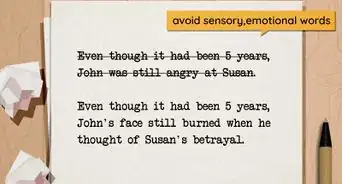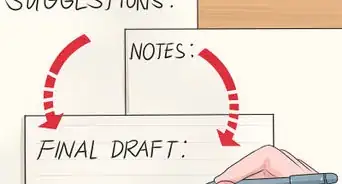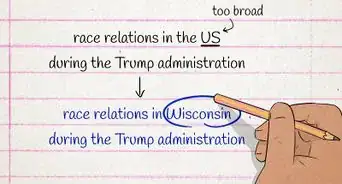This article was co-authored by Lydia Stevens. Lydia Stevens is the author of the Hellfire Series and the Ginger Davenport Escapades. She is a Developmental Editor and Writing Coach through her company "Creative Content Critiquing and Consulting." She also co-hosts a writing podcast on the craft of writing called "The REDink Writers." With over ten years of experience, she specializes in writing fantasy fiction, paranormal fiction, memoirs, and inspirational novels. Lydia holds a BA and MA in Creative Writing and English from Southern New Hampshire University.
This article has been viewed 50,401 times.
Style is vital to any writing project. From poetry to advertising copy, the choices you make will determine whether people continue reading, and what reaction they have.
Steps
-
1Choose words carefully. Find descriptive words that communicate the exact feeling you're going for. If you don't like the sound of a word, or you aren't sure it's the right choice, think of synonyms or alternatives.
- Try to avoid overused words, such as "good" and "bad" and "ugly" and "said." Instead, think about what you're trying to say. Does "good" mean charming, sunny, lucky, or something else?
- If you have trouble writing vivid descriptions, try a "comparagraph" exercise. Write a paragraph comparing any two people, objects, or settings. Try comparing a sunset to jewelry, or a forest to a woman.
- To improve your vocabulary, try reading a dictionary or a thesaurus. You can also read books in different genres or take a linguistics class.[1]
-
2Be clear and concise. Cut every unnecessary word from your writing. You may prefer lengthy descriptions or flowery language, but be strict at this stage. Most novice writers use many more words than necessary.Advertisement
-
3Begin and end on a strong sentence if you are writing an essay. Spend extra time polishing the first and last sentences of each paragraph in an essay. Aim for a punchy sentence that grabs the reader's attention. This practice can help improve the first and last sentences of a short story or novel chapter as well, although you have more room for stylistic changes.
-
4Learn the rules. Your writing will read more smoothly if you follow the rules of the English language. If you could improve in these areas, read our advice on grammar, spelling, and punctuation.
-
5Read widely.[2] If you are only exposed to your own writing, your 'writing world' will narrow considerably. There's no better tutor than a beloved book that inspires you to write. Explore new genres and authors as well, to expose yourself to new vocabulary and new styles of writing.[3] [4]
- Try writing in the style of a certain author as an exercise. Mimicry can force you to flex new writing muscles, although you should use your own voice for serious writing projects.[5]
-
6Listen to how people speak. To improve your dialogue, listen to how real people express themselves. How does someone's speech change when they're angry, sad, or in love? Learn how to reproduce real speech accurately in print if you ever want your dialogue to sound natural.[6]
-
7Make your characters believable.[7] If you're writing fiction, make your characters sound authentic. A doctor might sound educated and use obscure medical terms. The patient may just say he is feeling sick.
- If you're having trouble making characters sound different, give one of them an accent. An accent is difficult to write convincingly, but it will make the character seem different.
-
8Practice. You can read all you want about improving your writing, but if you don't actually put it into practice, you will not improve. Try to write every day, or as often as you can. If you keep putting it off, ask a friend to help keep you on task while she works on her own project in the same room.You can also practice in front of a mirror.
- Write about something that you've never written about before as a challenge.[8]
-
9Edit exhaustively. One famous piece of writers' advice: kill your darlings.[9] Cut every passage that doesn't fit into the rest of the work, or that's too personal for other people to appreciate. Edit for clarity and style as well. Correct mistakes and try out alternatives until you're satisfied.
- Never be afraid to trash something and start over. Authors have written and thrown away countless books, usually for good reason. If you don't feel good about what you wrote, scrap it and start over. The second (or fifth) version is often better, as you march in knowing the entire storyline.
- Ask your friends to give feedback. Even people with no writing experience can identify awkward passages, although you may need to find the solution yourself.[10]
Expert Q&A
-
QuestionWhat is the quickest way to improve writing?
 Lydia StevensLydia Stevens is the author of the Hellfire Series and the Ginger Davenport Escapades. She is a Developmental Editor and Writing Coach through her company "Creative Content Critiquing and Consulting." She also co-hosts a writing podcast on the craft of writing called "The REDink Writers." With over ten years of experience, she specializes in writing fantasy fiction, paranormal fiction, memoirs, and inspirational novels. Lydia holds a BA and MA in Creative Writing and English from Southern New Hampshire University.
Lydia StevensLydia Stevens is the author of the Hellfire Series and the Ginger Davenport Escapades. She is a Developmental Editor and Writing Coach through her company "Creative Content Critiquing and Consulting." She also co-hosts a writing podcast on the craft of writing called "The REDink Writers." With over ten years of experience, she specializes in writing fantasy fiction, paranormal fiction, memoirs, and inspirational novels. Lydia holds a BA and MA in Creative Writing and English from Southern New Hampshire University.
Author & Developmental Editor I would definitely say take writing classes, because those will challenge you to improve your writing style. You can also listen to podcasts or read workbooks, which all have different advices on how to do writing and how to improve your craft.
I would definitely say take writing classes, because those will challenge you to improve your writing style. You can also listen to podcasts or read workbooks, which all have different advices on how to do writing and how to improve your craft. -
QuestionHow can I improve my grammar and writing skills?
 Lydia StevensLydia Stevens is the author of the Hellfire Series and the Ginger Davenport Escapades. She is a Developmental Editor and Writing Coach through her company "Creative Content Critiquing and Consulting." She also co-hosts a writing podcast on the craft of writing called "The REDink Writers." With over ten years of experience, she specializes in writing fantasy fiction, paranormal fiction, memoirs, and inspirational novels. Lydia holds a BA and MA in Creative Writing and English from Southern New Hampshire University.
Lydia StevensLydia Stevens is the author of the Hellfire Series and the Ginger Davenport Escapades. She is a Developmental Editor and Writing Coach through her company "Creative Content Critiquing and Consulting." She also co-hosts a writing podcast on the craft of writing called "The REDink Writers." With over ten years of experience, she specializes in writing fantasy fiction, paranormal fiction, memoirs, and inspirational novels. Lydia holds a BA and MA in Creative Writing and English from Southern New Hampshire University.
Author & Developmental Editor Reading will always be the number one way to improve your vocabulary. I believe that readers make the best writers, so try reading whenever you can. You could also take a linguistics class, as they can teach you about how languages formed and how words are put into use. This is a really great way of learning how to combine words and work with them.
Reading will always be the number one way to improve your vocabulary. I believe that readers make the best writers, so try reading whenever you can. You could also take a linguistics class, as they can teach you about how languages formed and how words are put into use. This is a really great way of learning how to combine words and work with them. -
QuestionHow do I find my writing style?
 Phoebe LevitskyCommunity AnswerHonestly, the only way to find your writing style is through experience. Keep on reading and writing, and with time you'll see your own style start to emerge in your work.
Phoebe LevitskyCommunity AnswerHonestly, the only way to find your writing style is through experience. Keep on reading and writing, and with time you'll see your own style start to emerge in your work.
References
- ↑ Lydia Stevens. Author & Developmental Editor. Expert Interview. 1 September 2021.
- ↑ Lydia Stevens. Author & Developmental Editor. Expert Interview. 1 September 2021.
- ↑ Lydia Stevens. Author & Developmental Editor. Expert Interview. 1 September 2021.
- ↑ https://www.writingforward.com/better-writing/read-more-write-better
- ↑ https://thewritepractice.com/why-you-should-copy-other-writers/
- ↑ https://www.tckpublishing.com/better-dialogue-through-eavesdropping/
- ↑ https://www.nownovel.com/blog/how-to-create-believable-characters/
- ↑ Lydia Stevens. Author & Developmental Editor. Expert Interview. 1 September 2021.
- ↑ https://tinhouse.com/murder-your-darlings/
About This Article
To improve your writing style, try to practice writing every day since regular practice will make you a stronger writer. You should also read as much as you can to pick up helpful tricks and vocabulary words from other successful writers. In general, try to always be concise and clear with your writing, cutting out any unnecessary words or flowery descriptions. Also, keep in mind that the writing in your first draft doesn't need to be perfect, and you can always edit your writing as much as you want later on. To learn how to develop more believable characters for fiction writing, scroll down!










-Writing-Step-16.webp)














-Writing-Step-16.webp)





































